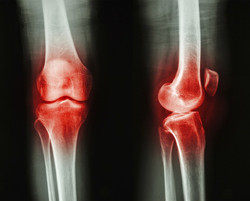Chronic inflammation research
Chronic inflammatory diseases are a prevalent cause of morbidity in the EU and are associated with important medical care costs and loss of work time. Chronic inflammation is associated with sustained release of specific signalling molecules, cytokines, and enzymes leading to altered antimicrobial responses. This results in reduced organ function and tissue destruction such as in cystic fibrosis, asthma or chronic obstructive pulmonary disease and emphysema. Neutrophils are short-lived leukocytes with vital functions in host defence. These white cells are recruited from the bone marrow, via the circulation, to tissue sites in response to danger signals. This immediate and vital inflammatory response can turn against the host if its intensity and duration are dysregulated leading to tissue injury. Indeed, the protective/pathologic role of neutrophils is demonstrated by the functions of neutrophil serine proteases (NSPs), potent granule enzymes that hydrolyse other proteins. These proteases directly kill pathogens and inactivate their toxins but they are also harmful by fuelling the inflammatory response and by destroying extracellular matrix proteins and immune defence proteins. The preliminary data indicated that protease inhibitor serpinB1 is required to preserve the neutrophil reservoir in bone marrow and to protect lung epithelial cells against NSPs. SerpinB1 is one of the best inhibitors of the three NSPs: neutrophil elastase, cathepsin G and proteinase-3. The EU-funded Marie Curie ‘Role of serpinB1 in cellular homeostasis in the bone marrow and the lung’ (SERPINB1) aims to investigate the regulation of NSPs by the serpinB1 in health and disease. Researchers found that serpinB1 prevents neutrophil death both at inflammatory sites as well as in the bone marrow. Using serpinB1 deficient mice, they investigated the function of serpinB1 in the development of emphysema in aging and in a model of cigarette smoke exposure. Results show that serpinB1 is not essential for regulating the extent of the emphysematous damage in the lungs following chronic smoke exposure. Another achievement of this project was the discovery that cathepsin G induces neutrophil cell death and that serpinB1 is essential in blocking this death pathway in neutrophils. SERPINB1 has created a substantial knowledge platform on inflammatory pathways implicated in lung disease. Knowledge at the molecular level will enable the development of new targeted therapies.







